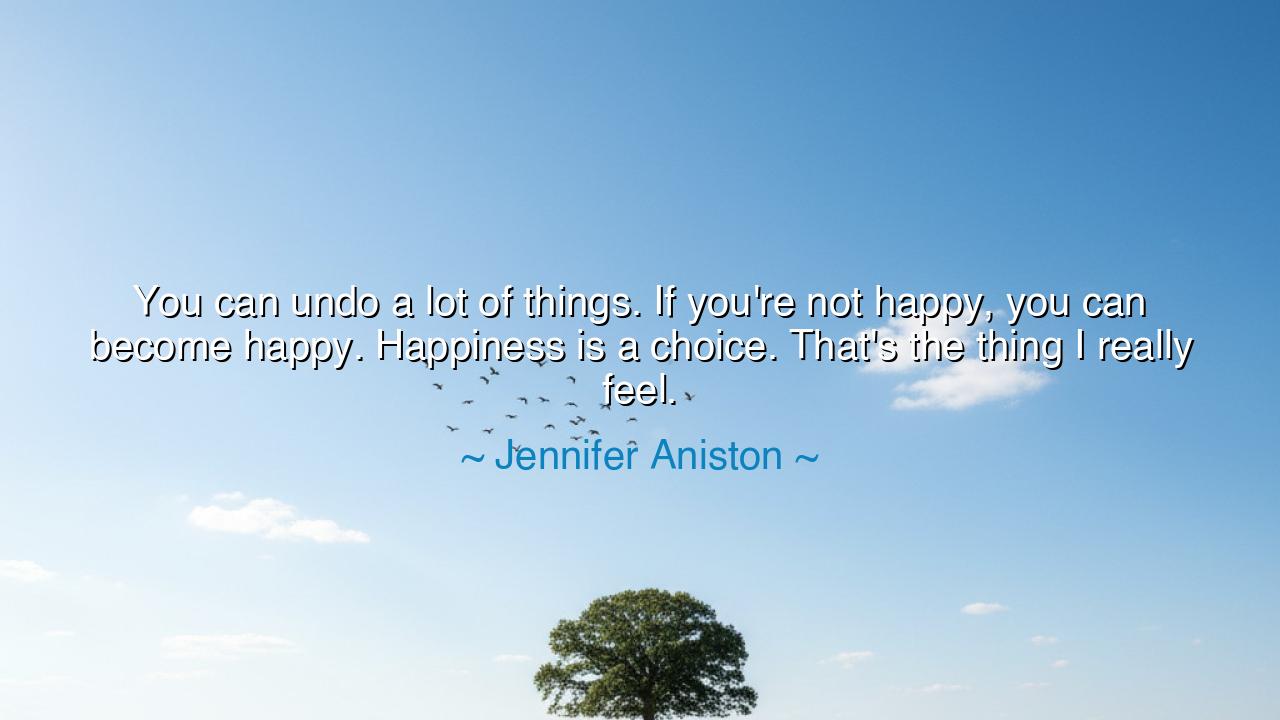
You can undo a lot of things. If you're not happy, you can become
You can undo a lot of things. If you're not happy, you can become happy. Happiness is a choice. That's the thing I really feel.






“You can undo a lot of things. If you’re not happy, you can become happy. Happiness is a choice. That’s the thing I really feel.” — Thus spoke Jennifer Aniston, not as an actress upon the stage of fame, but as a woman upon the stage of life. Her words, simple yet profound, carry the ageless wisdom that many seek but few embrace: that happiness is not bestowed by fate, nor bought by wealth, nor granted by others — it is a choice, born within the soul of each person. What she expresses is not the fleeting cheer of circumstance, but the deep truth of freedom — that we hold within us the power to change, to rise, and to begin again.
From the dawn of thought, the sages of every age have sought to understand the nature of joy. The ancients taught that happiness is not the absence of sorrow, but the mastery of it. The Stoic philosopher Epictetus said, “It’s not what happens to you, but how you react to it that matters.” In these few words lies the same revelation Aniston voices — that though we cannot command the storms of life, we can command our hearts. Fate may write the chapters of our story, but we decide the tone in which they are read. To become happy is to reclaim authorship of one’s soul.
The phrase “you can undo a lot of things” carries its own quiet power. It speaks to redemption — to the truth that the past, though written, does not bind the spirit. A person may have walked in sorrow, made mistakes, or suffered injustice, yet still possess the power to change course. Like a sculptor chipping away at marble, we can reshape the rough stone of our experiences into something beautiful. The past is not a prison, but a teacher. To undo is not to erase, but to transform. Every regret, every failure, every heartbreak can become a stepping stone toward wisdom — if we choose it to be so.
Consider the story of Nelson Mandela, who, after twenty-seven years in captivity, emerged not with bitterness, but with grace. The world expected anger; he chose forgiveness. The world expected vengeance; he chose reconciliation. In that moment, he embodied Aniston’s truth — that happiness is not given, it is chosen, even in the aftermath of despair. From the depths of confinement, he rose with the light of peace in his heart, and his choice reshaped a nation. Such is the might of the soul when it refuses to surrender its joy to the cruelty of circumstance.
Yet this choice is not made once — it is made daily, sometimes hourly. The human heart is a garden that must be tended. Happiness does not grow by accident; it grows where patience, gratitude, and compassion are sown. Those who wait for life to make them happy wait forever. But those who seek to find joy in small things — a sunrise, a kind word, a moment of laughter — build an inner kingdom that no darkness can overthrow. The ancients called this the art of contentment, and it is the highest art of all.
Aniston’s wisdom also speaks to the modern soul, weary from comparison and noise. In a world that tells us happiness lies elsewhere — in possessions, in success, in the approval of others — her words call us back to the truth: happiness begins where the self begins. It is not found in the applause of the crowd, but in the quiet peace of knowing who you are. To choose happiness is to rebel against despair, to say, “Though the world may not be kind, I will not let it darken my spirit.”
The lesson, then, is as old as it is urgent: you are the keeper of your own joy. Do not wait for another to bring it, nor for fortune to deliver it. Begin now. If you are burdened, release what you can; if you are wounded, forgive what you must. Each breath, each sunrise, each act of kindness is a chance to begin anew. The chains of misery are not forged by the world, but by our refusal to let go of them. Happiness is a choice — and every choice begins in this moment.
So remember this, my child: life will wound you, but it will also whisper to you, softly, that healing is possible. You can undo much of what has been done, not by changing the world, but by changing your heart toward it. Walk each day with open eyes and open soul. Choose light when darkness calls. Choose gratitude when envy tempts. Choose peace when anger beckons. For in every act of choosing, you reclaim your power — and there, in that sacred act, you become happy, not by chance, but by courage.






AAdministratorAdministrator
Welcome, honored guests. Please leave a comment, we will respond soon